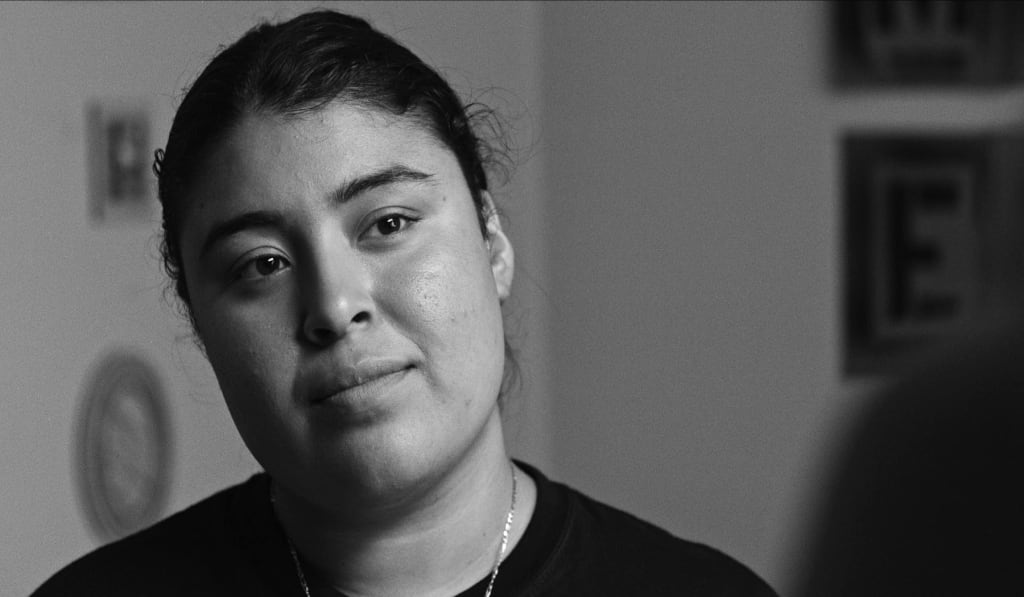Movie Review: 'La Leyenda Negra' A Cry in Black and White
La Leyenda Negra demonstrates the power of art and protest in the time of Trump.

Aleteia (Monica Betencourt) is hanging onto her American dream but just barely as the powers that be in Washington D.C keep threatening more and more of her existence. Aleteia has become radicalized in the war on immigrants, not just because she herself could be adversely affected, but because she believes in the power of a revolution.
She has to believe it as she finds herself on many sides of a cultural war. There is Trump's war on her people, and a conservative war on her gender freedoms. Not to mention her LGBTQ rights. It's not stated outright in the new drama La Leyenda Negra that Aleteia is non-binary but there are a lot of aspects of Aleteia's life that she's still trying to figure out.
Aleteia is thrown for a loop when one of the popular girls in her new school, Compton High School, suddenly takes an interest in her. Rosarito (Kailei Lopez) is tired of her bitchy friends, especially her longtime BFF, Monica (Irlanda Moreno), who has become unbearably shallow and self-centered now that she knows that Rosarito is soon to leave for college.
Rosarito is assigned to Aleteia as a partner on a school project. More honestly, she switched partners with Monica as a protective gesture for Aleteia whom she has a growing affection for and doesn't to see Monica bully her toward an unearned grade while mercilessly mocking the poor girl with the good grades and big opinions.
With Rosarita as her partner, their bond is cemented after a day of hanging out at a cousins' Quincineara. All appears well when Monica arrives to stir the pot and try and convince Rosarito to abandon Aleteia in favor of Monica returning to bask in Monica's many insecurities expressed uncertainty about her own place in the world.
There is no dialogue that spends any time explaining the plot for La Leyenda Negra, it's all implied and inferred. The lack of expository dialogue gives the movie a lived in quality that is lacking from most mainstream features which lean heavily on the lazy device of tell don't show. La Leyenda Negra is all show and little tell and better for it.
Monica Betancourt is a revelation, a moody, sad and sympathetic young woman with a natural quality typical of non-actors but with none of the awkwardness. Betancourt, though this is her first feature film, carries herself with a veteran assurance. Betancourt has a swagger to her, a sense of proportion that some veteran actresses could learn from .
La Leyenda Negra was written and directed by Patricia Vidal Delgado, a veteran of the short film world who makes the step up to feature films with La Leynda Negra. It is a natural and quite comfortable transition. Delgado directs with deftness, an artful eye and an ear for the natural rhythms of people who know each other and the awkward tension of beginning to know someone.
Delgado is unafraid of stacking La Leyenda Negra with lots of big themes. A certain Twitter obsessed President of the United States is name-checked a couple of times and not so flatteringly. But La Leyenda Negra has rage to spare on behalf of the hundreds of thousands of people who've been undermined and betrayed by not just the President but those who pay lip service to change but appear content to allow the oppressed to suffer so that their suffering can be leveraged into shame and political advantage.
Shot in striking black and white, La Leyenda Negra is lovingly lensed by Matt Maio who gives the film a crispness that only great black and white cinematography can deliver. Black and white itself is a metaphor for the duality at the heart of La Leyenda Negra which has rage to spare for those who believe that the world is black and white, right and wrong and without nuance or circumstance.
As I said earlier in this review, there is nothing overt about the film's place in the world of LGBTQ politics but there are strong indications that one or both Aleteia and Rosarito is non-binary hiding in a few scenes of La Leyenda Negra. The film ends too abruptly to explore the hints of same sex romance but what we see is undeniably affecting.
La Leyenda Negra directly references DACA and Dreamers and captures the desperate insecurity of those who are the true victims of supposedly 'conservative' notions of immigration. La Leyenda Negra demonstrates what happens when policy makers blindly follow strict interpretations of laws and fail to or simply don't look at the harm they are committing.
La Leyenda Negra is powerful and wrenching. The look of the movie is incredible and the young first time actors that make up the cast are a wonderfully natural and affecting group, easy to care about and root for. I want to offer some praise here for actress Irlanda Moreno who fearlessly portrays a bully character as Monica and does so fearlessly while subtly implying how insecurity and fear drives her actions.
La Leyenda Negra is set to be featured at the Sundance Film Festival where studios will have the chance to determine the film's release schedule. Sadly, I imagine that liberal use of subtitles in the film will likely prevent a wide theatrical release. Watch for La Leyenda Negra on your favorite streaming services later this year.
About the Creator
Sean Patrick
Hello, my name is Sean Patrick He/Him, and I am a film critic and podcast host for the I Hate Critics Movie Review Podcast I am a voting member of the Critics Choice Association, the group behind the annual Critics Choice Awards.






Comments
There are no comments for this story
Be the first to respond and start the conversation.